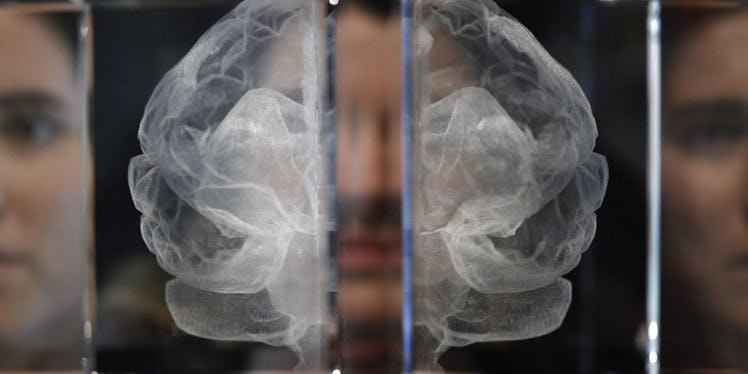Oxytocin, Dopamine, And The Brain Chemistry Of Marriage
Having good chemistry isn't just an expression.

You might believe that you’re with your spouse because of common attraction, shared values, mutual respect. That, and the ability to pee with the door open. But did you know that you’re also chemically wired to make it work? (You didn’t — that’s why you’re still reading.) There’s a lot out there about the science of attraction — hormones and pheromones and whatnot — but there’s just as much biology behind why couples stay in a relationship.
Dawn Maslar, M.S., adjunct biology professor, researcher, and expert in the “science of love” has the scientific rationale behind that warm and fuzzy feeling you get when you look at your wife and kid. You probably don’t need to see a doctor about it.
The 2-Year Honeymoon Period
“When a person is falling in love, there’s a biological stage where your brain goes into hormonal upheaval, and it lasts for about 2 years,” says Maslar. “Your serotonin levels can drop to the level of someone with OCD, which is what gives you that obsessive wanting to be with the other person feeling — why you can’t eat, you can’t sleep.”
During this phase, in the words of High Fidelity’s Rob Gordon, your guts have shit for brains. Maslar says the amygdala — that warning sensor of the brain that prevents you from getting a neck tattoo of her initials — shuts down. As does the ventromedial prefrontal cortex, which is the part of your brain that rationalizes whether you want to be with this person. Once you’ve cleared this milestone with minimal physical or psychological damage, you move on to the next phase.
When You Feel Like Putting A Ring On It
When a man gets to the commitment stage of a relationship, his testosterone levels lower. Maslar says this is when you consider deleting Tinder. “Basically, it knocks a man out of the dating pool,” she says. “They don’t want to run out and chase and compete.”
Testosterone also blocks oxytocin, the “bonding hormone,” so your lower T is now making your partnership stronger, because those oxytocin levels are free to go up. Studies show that it doesn’t matter if there’s a legal piece of paper saying you’re together, the biology works the same.
When You’re Most Attracted To Your Wife
You’re most attracted to your wife when she’s ovulating. As you learned way back in sex-ed, that doesn’t happen during pregnancy. But, when she is pregnant, her oxytocin levels will increase (and so will yours), which means you’ll feel more bonded. It’s sort of like the chemical insurance policy as sex wains in the third “Don’t look at me, I’m a house” trimester.
But Babies Still Bring Couples Together
All that pushing in the delivery room ends in a massive push of that crazy oxytocin in your wife at delivery (also: a baby). Masler says oftentimes you’ll get a reciprocal boost. During this time when everyone is feeling the love, your wife’s elevated hormone levels will make her feel more connected to both of you. First solution to staying together: Have a kid every year!
After the baby, you’re probably wondering how nature plans to keep a couple together with the lack of sleep, sex, and sanity. “Sex is just one part,” Maslar explains. “If you want to maintain sexual activity, you need passion — and dopamine.” Here’s how to get your sex life back on track — if you’re interested.
How The Sex Of Your Kid Affects Your Relationship
Also, Maslar points out that there is difference between having a boy versus a girl. When you have a baby girl, your testosterone levels drop “to the level of someone being castrated,” she says. “Biologically speaking, it’s an excellent thing. He’s more likely to stick around, feels more bonded to his wife and daughter, and is less sexually aggressive.” With boys there’s also a drop, but it’s less significant. Probably saving those reserves to teach them how to grow a handsome moustache.
The Talking Cure
So if there are all these chemically-induced peaks and valley in this roller coaster of monogamy, how do you predict when things are “bad” or when “it’s just a phase”? “The decline bottoms out at right about 10 years, and then relationship satisfaction starts going back up again,” says Maslar. “When you’ve gone past the first couple years, the neural activity changes. If a man stays in a relationship longer, he becomes more moral, ethical, compassionate, and loving with higher oxytocin levels.”
“If you want to maintain sexual activity, you need passion — and dopamine.”
But you can’t rely on your feel-good chemicals to take care of things. There’s a self-fulfilling prophecy in the biology in a relationship: If your feelings are more roommate than romance, your wife’s oxytocin levels can drop. When she’s upset, your testosterone levels drop. Great, now you’re both depressed. But Maslar says the remedy is simple, and you don’t have to pay $200 an hour for it: Conversations about anything, even if it’s not about the relationship, can boost those levels again.
“There were studies done with couples where the women weren’t interested in being sexual. One group of women were given nasal oxytocin and talked with their partner about sexuality and the relationship. In the other group, they just talked,” says Maslar. “They discovered that both groups were improved.” Just don’t say anything about her hormones.
This article was originally published on